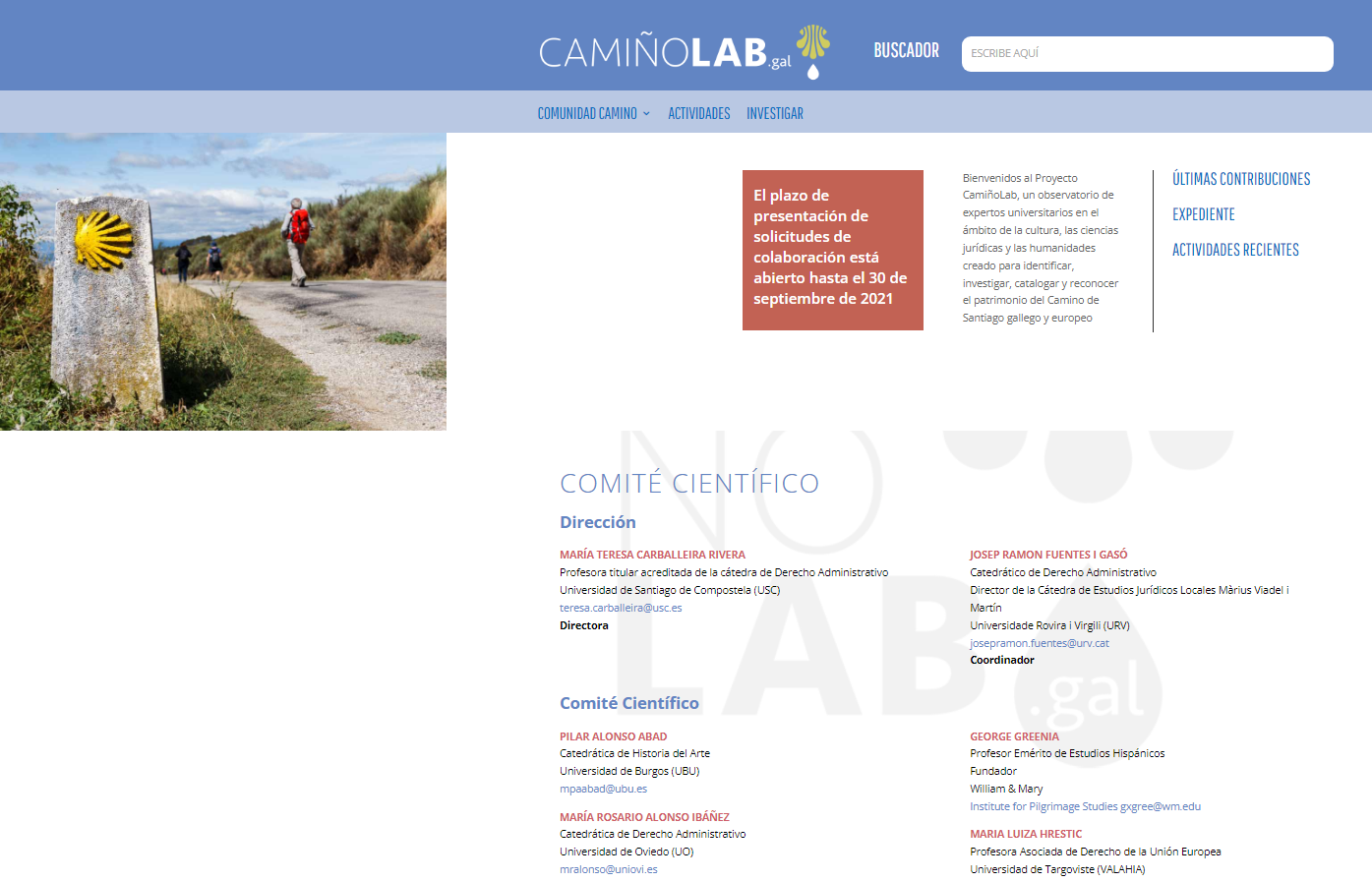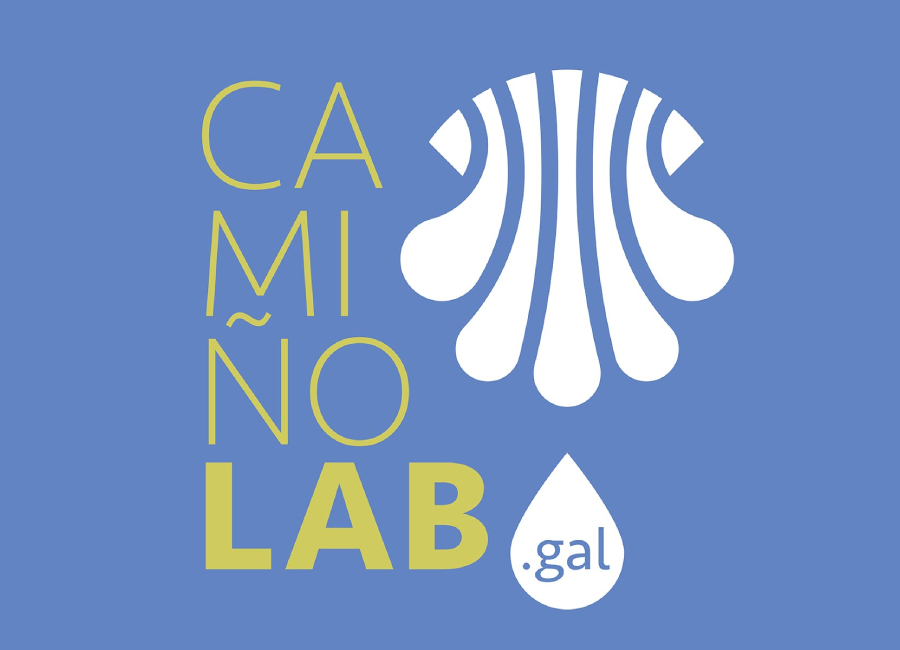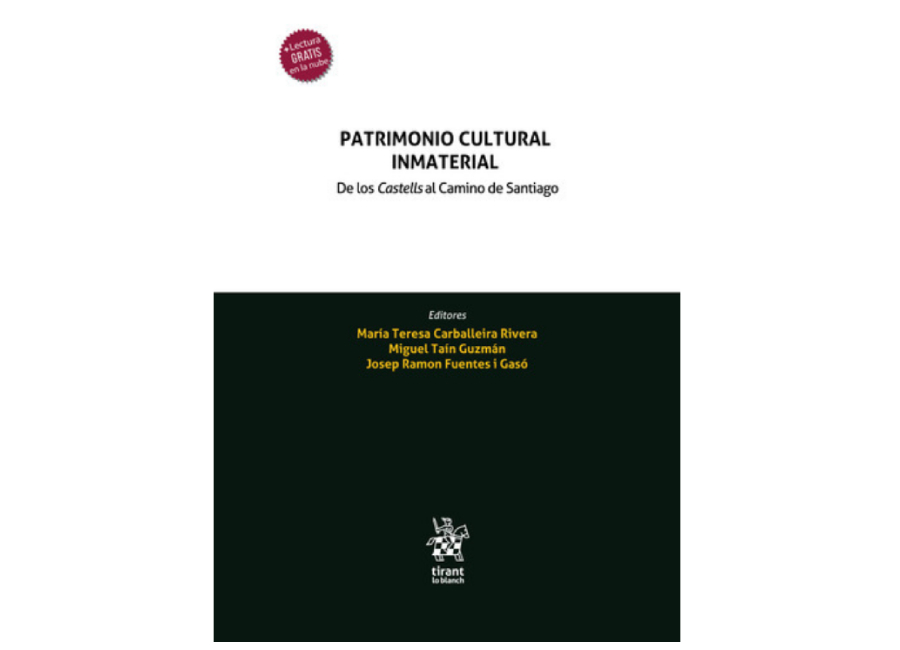CAMIÑOLAB
The project ‘CAMIÑOLAB. Laboratory of the intangible heritage of the Camino de Santiago’ promoted the building of an observatory of university experts in the academic fields of culture, legal sciences and humanities. The aim of the initiative was to identify, research, catalogue and recognise the tangible and intangible heritage linked to the pilgrimage route, starting with that of the Spanish Region of Galicia.
CAMIÑOLAB activities ran from 7 January to 30 September 2021, mainly online due to the covid-19 pandemic. These included work such as the identification and consolidation of the expert observatory, as well as the definition of its lines of work. In its conclusion, the work carried out by the scientific committee resulted in a web portal and a scientific publication, as means of disseminating the results to the research community and society in general.

Project actions
Identification of experts
In the initial phase of the project, the CGU sent a personalised invitation to participate to academic experts in cultural heritage from the network’s member universities and other collaborating institutions.
Establishment of the scientific committee
A total of 31 academic experts from the fields of Legal Sciences, Art History, Social Anthropology, European Studies, Hispanic Studies, and Humanities joined the CAMIÑOLAB scientific committee. These experts came from 15 universities based on the European and American continents.
Scientific committee
MEMBERS
Carballeira Rivera, María Teresa – Director
Full professor of Administrative Law at the University of Santiago de Compostela and Executive Secretary of the Compostela Group of Universities.
Fuentes i Gasó, Josep Ramon – Coordinator
Professor of Administrative Law and Director of the Màrius Viadel i Martín Chair of Local Legal Studies at Rovira i Virgili University.
Alonso Abad, Pilar
Professor of Art History at the University of Burgos.
Alonso Ibáñez, María Rosario
Full professor of Administrative Law at the University of Oviedo.
Arana García, Estanislao
Professor of Administrative Law at the University of Granada.
Barcelona Llop, Javier
Full professor of Administrative Law at the University of Cantabria.
D’Orsogna, Domenico
Professor of Administrative Law at the University of Sassari.
Franca, Marcilio
Professor of Art Law at the Federal University of Paraiba.
García Rubio, Fernando
Professor of Administrative Law at the Rey Juan Carlos University.
Greenia, George
Professor Emeritus of Hispanic Studies and founder of the Institute for Pilgrimage Studies at William & Mary.
Hrestic, Maria Luiza
Associate Professor of European Union Law at the University of Targoviste.
Silveira, Alessandra
Director of the Centre for European Union Law Studies at the University of Minho.
Taín Guzmán, Miguel
Professor of Art History and Director of the Chair of the Camino de Santiago and Pilgrimages at the University of Santiago de Compostela.
Torres López, María Asunción
Professor of Administrative Law at the University of Granada.
Velasco Maillo, Honorario M.
Emeritus full professor of Social Anthropology at the National University of Distance Education.
CONTRIBUTING MEMBERS
Álvarez Sousa, Antón
Full professor of Sociology at the University of A Coruña.
Fernández Marcial, Viviana
Professor in Humanities and Documentation at the University of A Coruña.
González Lopo, Domingo
Professor of Modern History at the University of Santiago de Compostela.
Definition of the scientific-academic plan
In the first phase of its work, the scientific committee focused on the legal and historical conceptualisation of intangible heritage, as well as the definition of a practical methodology for the identification of the legacy under study. Then, they finalised the scientific-academic plan, which included the strategy for developing field research and producing a catalogue of scientific material.
Project results
Research web portal
Creation of a space in which to detail the advances and results of the research, so that they can be available to the scientific community and society.

Logo of the project
To provide the initiative with a corporate image, a logo was designed that references both the Camino de Santiago and the laboratory of academic experts.

Publication
The book ‘Patrimonio cultural inmaterial. De los Castells al Camino de Santiago’ (Intangible cultural heritage. From the Castells to the Camino de Santiago) includes 33 chapters in which it tackles a multidisciplinary approach – legal, historical and anthropological – the concept, cataloguing and legal regime of intangible cultural heritage.
The work was published by Tirant lo Blanch in November 2021.

Organiser
This project was organised by the Compostela Group of Universities (GCU).

Co-leaders
The following public universities in Galicia were co-leaders of this project:

Sponsor
‘CAMIÑOLAB. Laboratory of the intangible heritage of the Camino de Santiago’ was sponsored by the Regional Government of Galicia (Xunta de Galicia) under O Teu Xacobeo programme.


Collaborators
The European Institute of Cultural Routes of the Council of Europe collaborated on this project.

